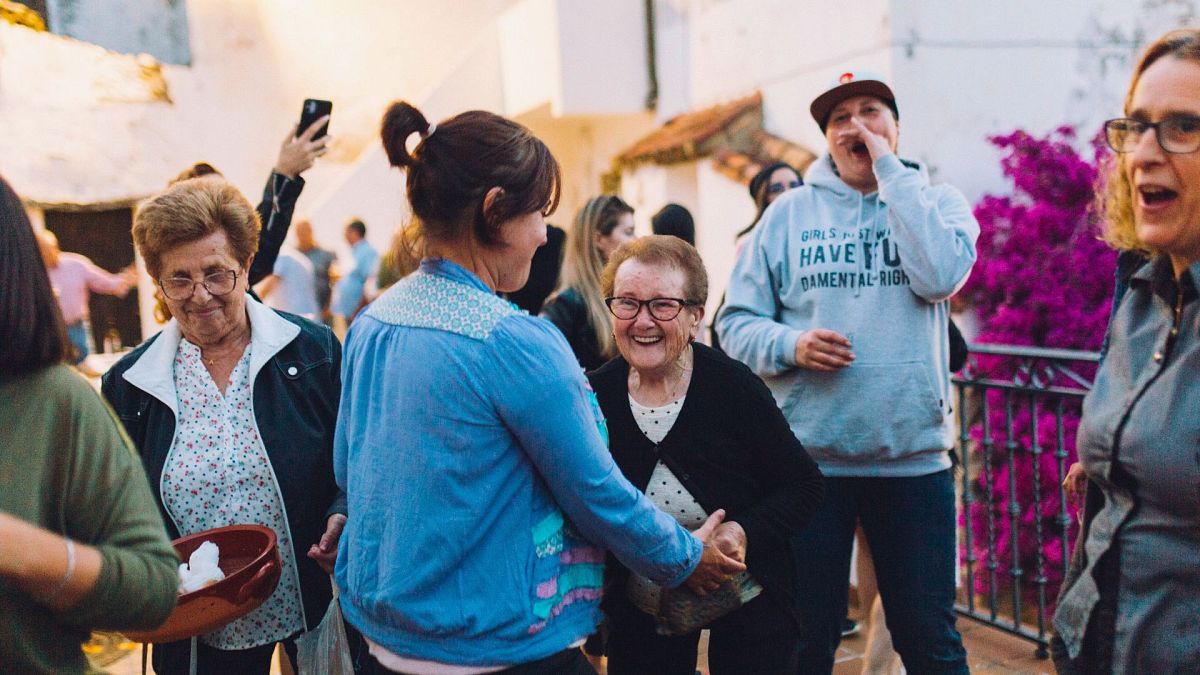The boom in remote working in recent years has turned major European cities like Lisbon, Barcelona and Berlin into so-called ‘digital nomad hubs’.
But tensions are running increasingly high between local communities and those who have temporarily set up their laptops in town.
Whether it’s being priced out of the housing market or cafe owners banning ‘laptop squatters’, locals are speaking out against the negative impacts.
As these hubs feel ever more crowded and contentious, some entrepreneurs are taking the digital nomad lifestyle in a more mindful direction in the countryside.
Here, they’re not only welcomed, but generate a positive impact for rural communities.
Reinvigorating rural communities in Spain
While an overabundance of digital nomads and tourists strains local infrastructure in popular cities, many rural parts of Europe have the opposite problem.
Depopulation threatens the existence and vitality of small villages and towns, as younger generations especially migrate towards larger cities.
“Spain is one the countries in Europe with the biggest demographic gap,” founder of co-living experience Rooral Juan Barbed tells Euronews Travel. “Half our villages are dying, like in the terminal stage.”
After years spent travelling and working between some of the world’s biggest cities, Juan was confronted with this decline when he returned to his grandmother’s village following her death.
At the same time, he was moved by the community’s warm welcome. He felt sure other digital nomads were also craving the sense of connection he found there.
“We grew up with this narrative that success was in big cities. But now you have infrastructure that can allow you to work from wherever,” says Juan. “We thought, what if we make it easy for people to test how it is to work from a rural village?
“So we created this association that partners with small villages at risk of depopulation to welcome remote workers.”
He and his co-founder Ana Amrein tested their concept in a handful of villages, aiming to stimulate rural economies and create meaningful cultural exchanges.
“We don't just go to a village and start doing it. We make an agreement with the town hall, with local associations, with businesses, with the community itself. We advance at the speed of trust,” Juan explains.
The feedback from the first villages that hosted Rooral was unequivocally positive: “When we asked what they didn't like about having us in town, they were saying that we left!”
Welcoming digital nomads to the pueblo
Rooral now has a permanent base in the Andalucian village of Benarrabá. Local resident Mari Angeles tells Euronews Travel how delighted she is to have people from all over the world discover her village, never usually on the radar of foreign visitors.
“They interact wonderfully with our people,” she comments. “I enjoy it when they come to shop at our family’s little supermarket in the village, and we get to chat. I loved a dinner we had together where they shared what they liked most about the village: the sense of community, the deep connections, the peace and the beautiful nature.”
Rooral facilitates these connections with the, often elderly, local residents through activities and events. It’s common to find visitors and locals sharing dinners, or digital nomads learning about local customs, like making goat’s cheese and the extraction of cork.
The remote workers also volunteer their time in different ways, from helping on farms to offering digital skills workshops, like an introduction to coding.
“For the people of the village, it’s wonderful because [the digital nomads] display all their skills and welcome them with all the affection that characterises them,” adds Mari Angeles. “And for the young people, it’s very good to be able to interact and see another perspective.
“I feel very happy and content with these beautiful encounters - they make you see the village from another perspective.”
Juan confirms that while the economic benefits are what normally first interest a village, in the end it’s the influx of fresh faces and energy that really make their mark on the community: “These newcomers show a deep appreciation for the local culture and traditions, which helps to revitalise the sense of pride and self-esteem in rural areas.
“The exchange of ideas and the blending of different backgrounds create a dynamic environment. Ultimately, it benefits the social and cultural fabric of the village.”
Impact-led co-living experiences: The start of a movement?
Rooral isn’t the only one tapping into the potential of digital nomads.
In the mountains and countryside of northern Italy, a group of territorial regeneration and social innovation experts set up NATworking. They also create co-living experiences to revitalise areas at risk of depopulation.
Their ‘NATweeks’ combine downtime in nature, slow tourism activities and community projects promoting local development.
Echoing Juan, the desire among many remote workers to carve out more balanced lifestyles and a stronger connection to nature also inspired the team. It was something they’d personally experienced, one of the project managers Francesca Albera tells Euronews Travel.
“We realised that the ability to work remotely doesn’t necessarily translate into a better quality of life. So we were interested in creating a link between territorial activation and improving work and living conditions for remote workers.”
Rural digital nomad experiences foster long-term connections
For now, NATworking only organises short-term co-living experiences. But it still creates a lasting impact with partner communities.
“Many NATworkers return to their host areas to give something back to the people they met there, opening up ongoing community activation,” says Francesca.
“For example, last May we spent a week with a group of remote workers in San Pietro di Monterosso, living and working in Valle Grana. In June we came back to run a workshop on civic design, to plan a revitalisation project for Combetta, a small village close to San Pietro.
“Many participants of the previous NATweek decided to come back because they understood the value of the place and people. They had the desire to contribute to the local development.”


